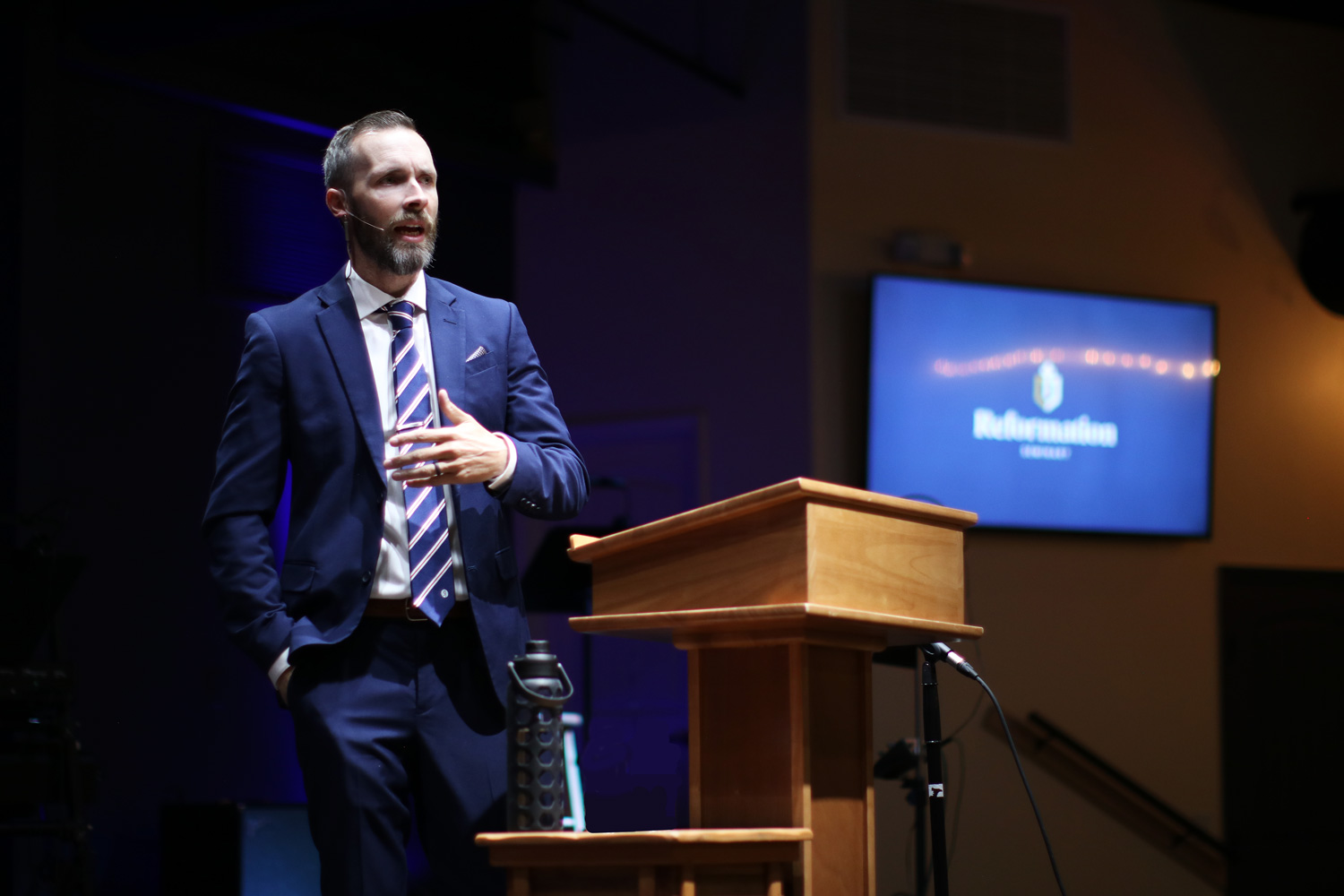Why smaller is better: Our model for planting local churches
AN ALTERNATIVE TO BIG CHURCHES
Our 15-Point Model
We are dedicated to establishing small, intimate, and traditional local churches. We believe that smaller churches have a greater impact on local communities, and we consider this model more effective than constructing large, flashy, and rapidly growing churches that aim to be culturally relevant.
Our model for planting churches is centered around several key principles that we believe are biblically sound and rooted in historic Christianity.
- Our church planters aim for local churches that are less than 500 members in size. This allows for a more intimate and personal experience for each member and helps foster a sense of community and belonging that’s often absent in modern congregations.
- Our church planters have only one service per Sunday. Multiple services can often feel like multiple churches, which can be confusing and disorienting for members. Instead, we opt for one service that everyone attends together, creating a sense of unity and shared experience.
- Our church planters establish confessional assemblies that affirm either the Westminster Statement of Faith or the 1689 London Baptist Confession of Faith.
- Our church planters are expository preachers who emphasize the content of the biblical text rather than the personal opinions or experiences of the preacher. Their central aim is to explain and apply the meaning of a particular passage of Scripture, with the goal of communicating the author’s original intent to the congregation.
- Our church planters are committed to partaking in the Lord’s Supper each week, emphasizing the importance of this sacrament in our worship.
- Our church planters believe in the importance of church membership, which requires attendees to make a formal commitment to the church by affirming its confession of faith, submitting to the eldership, and contributing to its flourishing through regular attendance, prayer, giving, and other practical means of support.
- Our church planters establish family-integrated churches, which means that we do not encourage separate children’s ministries. Instead, we teach pastors how to shepherd an affection for worship where children can listen to the pastor’s sermon, pray with the congregation, and observe corporate piety alongside their parents.
- Our church planters host a post-gathering fellowship meal every Sunday, providing time for members to get to know one another and fulfill the “one another” commands of Scripture. This helps to build rich relationships and furthers a sense of genuine community.
- Our church planters aim for bi-vocational ministry, meaning that, if possible, they work another job in addition to their pastoral duties and do not receive full-time salaries. Instead, they are offered a stipend from their congregation. When a pastor’s income fully depends on the congregation, there’s a risk of avoiding difficult truths or corrections to please financial supporters. Bi-vocationalism ensures pastors can speak the truth without such concerns, promoting genuine Gospel preaching for spiritual growth and maturity.
- Our church planters are committed to having one elder per ten-member family and one deacon per twenty-member family, allowing for proper and intimate care and service to the flock.
- Our church planters cultivate congregations that sing well, with a particular emphasis on hearing the voices of the members themselves rather than relying on instruments or worship leaders. While we do not forbid instruments, we believe they should be used in a modest manner that amplifies the voices of the congregation rather than drowning them out.
- Our church planters hold weekly men’s and women’s meetings. These meetings have elder oversight for the men and the presence of elder’s wives for the women, ensuring protection and spiritual guidance. This approach promotes more intimate and personal interaction between men and women while maintaining a sense of spiritual safety and accountability.
- Our church planters do not offer live-streaming of our Sunday service, as we believe in the importance of physical presence and connectedness.
- Our church planters actively promote a church culture of “one anothering,” which involves regular gatherings such as house-to-house dinners or lunches, coffee dates, and other activities that help to strengthen the bond between members.
- Our church planters hold an optimistic eschatology, firmly believing that the gates of hell will not prevail against the church, and that Christ will continue to convert the lost by the proclamation of the Gospel. With this in mind, our church planters actively evangelize their communities, stand for righteousness in their cities, and develop effective resources to further the influence of the church in their towns.
At the heart of Reformation Seminary is a focus on intimacy and fruitfulness rather than size. Our goal is to train men in how to cultivate small, mature, and deeply connected congregations. Any growth that occurs as a result of this approach is aimed at raising up qualified pastors who can then go on to plant other like-minded local churches.
Planting Smaller
Churches
They’re Intimate
Small churches force congregations to be deeply connected while also encouraging the sense of family that seems to be missing among Christians today.
They’re Fruitful
Small churches with sufficient pastoral leadership permit a degree of nurture that protects against members lacking proper discipleship, resulting in a vibrant congregation.
They’re Reproducible
Small churches maintain a level of simplicity that allows for more feasible multiplication. More churches equal a more diversified local effort and a greater opportunity for community saturation.
Our Founder & Founding
Dale Partridge is the President of Reformation Seminary and Relearn.org. He holds a Graduate Certificate from Western Seminary. He is the author of several Christian books, including “The Manliness of Christ” and the bestselling children’s book “Jesus and My Gender.” He is also the host of the “Real Christianity” podcast and the Senior Pastor at King’s Way Church in Prescott, Arizona.

As an instructor at the seminary, Dale primarily focuses on hermeneutics and expository preaching but also assists in teaching courses on church history and systematic theology. Personally, Dale adheres to the Westminster Confession of Faith and identifies with Reformed theology, including postmillennialism, general equity theonomy, and biblical patriarchy.
The Birth of Reformation Seminary
In 2019, Dale Partridge and Dr. Jason Barker founded the Seminary with a mission to produce an alternative approach to the popular Western trend of planting big, flashy, and culturally relevant churches. Together, they aimed to produce elders and pastors who could plant and pastor intimate and reverent Protestant churches that held sound doctrine and robust fellowship.
Nestled in the Southwest
Located in Prescott, Arizona, Reformation Seminary becomes an inviting destination for students looking to experience a vibrant church community, God’s majesty in nature, and the more than 300 days of sunshine bestowed upon this small Northern Arizona township.

LOCATED IN PRESCOTT, ARIZONA
As a popular resort town with visitors from around the world, Prescott is an ideal location for students to experience not only God's natural beauty but also where students can attend King's Way Bible Church pastored by Dale Partridge
practical academia
As an academic program, Reformation Seminary is a rigorous one-year, graduate-level theology curriculum for men. The Reformation Seminary Admissions Committee is highly selective and is looking for men with high character, a foundation of biblical knowledge, and clear pastoral gifting. While the curriculum is based upon the adapted historic evangelical church doctrines found within orthodoxy, they can be simplified into four academic categories.
1. Biblical knowledge
Students will spend twelve months watching, studying, discussing, preaching, writing, and testing foundational biblical and theological knowledge and disciplines.
2. Exegesis and preaching
In like manner, students will strengthen their aptitude in extracting and communicating the meaning, lessons, and application of the biblical text.
3. Pastoral disciplines
Students will develop an understanding and reverence for the character and responsibilities of a biblically qualified pastor, counselor, and leader.
4. Planting and multiplication
Students will learn the scriptural mandate, principles, and strategies for establishing and multiplying biblical culture within a local church.